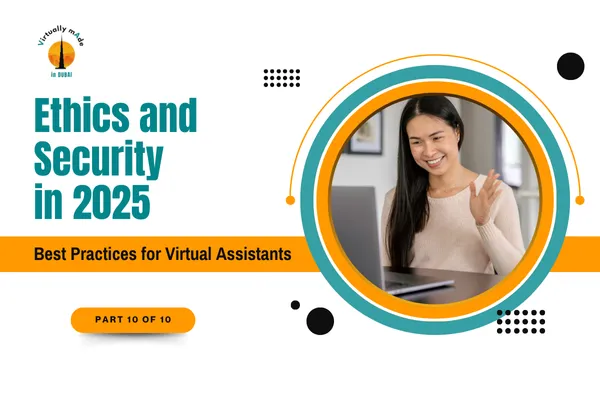BLOGS AND ARTICLES

Ethics and Security in 2025: Best Practices for Virtual Assistants
In a world increasingly dependent on virtual work, Virtual Assistants (VAs) must uphold the highest ethical and security standards to build trust and credibility with their clients. As we close this 10-part series on thriving as a VA in 2025, let’s delve into the essential practices for safeguarding data and maintaining professional ethics in a rapidly evolving landscape.
The Importance of Ethics and Security
Trust is the foundation of every successful VA-client relationship. Without it, no amount of skill or efficiency can sustain long-term partnerships. Upholding ethical standards and robust security practices isn’t just about compliance—it’s about showing respect for your clients' sensitive information and business goals.
In 2025, the digital workspace has brought new challenges, including sophisticated cyber threats, increased regulatory scrutiny, and greater expectations for transparency. By adopting best practices in ethics and security, VAs can demonstrate their commitment to protecting their clients and maintaining professionalism.
Best Practices for Maintaining Ethical Standards
Confidentiality is Non-Negotiable
Always treat client information with the utmost discretion. Sign non-disclosure agreements (NDAs) when required and ensure that all data shared with you is securely stored.Avoid Conflicts of Interest
Be upfront about any potential conflicts that could compromise your work integrity. Transparency builds trust and prevents misunderstandings.Honesty in Communication
Deliver honest updates about tasks, timelines, and capabilities. If you make a mistake, own it and work on solutions immediately.Respect Professional Boundaries
Maintain a professional relationship with your clients. Set clear expectations about your role and avoid overstepping boundaries.Continuous Professional Development
Keep learning. Ethical decision-making often requires critical thinking and a deep understanding of the latest industry standards.
Best Practices for Ensuring Security
Use Secure Platforms and Tools
Leverage encrypted communication platforms and cloud-based tools that offer multi-factor authentication.Regularly Update Systems
Keep your devices, software, and antivirus programs up-to-date to minimize vulnerabilities.Follow Data Protection Laws
Familiarize yourself with regulations like the General Data Protection Regulation (GDPR) or any local data protection laws that apply to your clients.Practice Strong Password Hygiene
Use unique, complex passwords for every platform and store them securely in password management tools.Be Wary of Phishing Scams
Stay vigilant for suspicious emails or links and educate yourself about common cyberattack strategies.
Why This Matters
Adhering to ethical and security standards isn’t just about ticking boxes—it’s about showing clients that you’re reliable, competent, and trustworthy. As competition in the VA industry grows, these qualities will set you apart from the crowd.
Closing the Series with a Commitment
As we conclude this series, remember that thriving as a Virtual Assistant in 2025 requires more than just technical skills. Your success will depend on your ability to build lasting relationships founded on trust, ethics, and security.
Are you ready to take the next step in your VA career? Stay ahead of the curve by subscribing to our newsletter for more tips, strategies, and resources designed to elevate your VA business in 2025 and beyond.
Subscribe Now and let’s build a future rooted in trust and success!
Ready to future-proof your VA career?
👉 Subscribe to our Newsletter on LinkedIn
👉 Visit our website at virtuallymade.org for exclusive content and resources.s.

